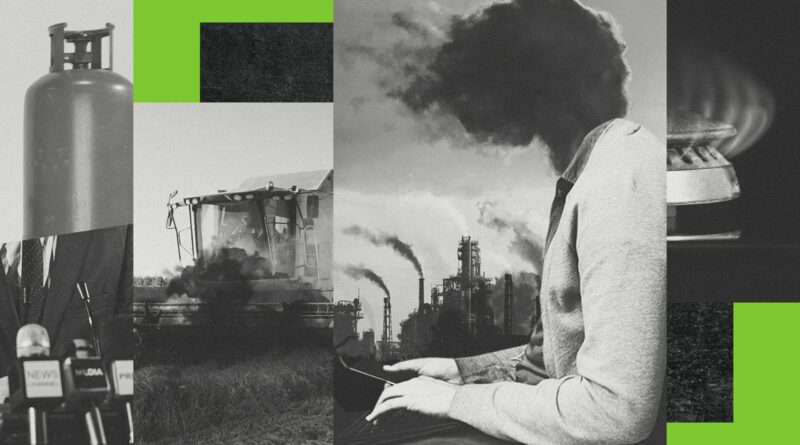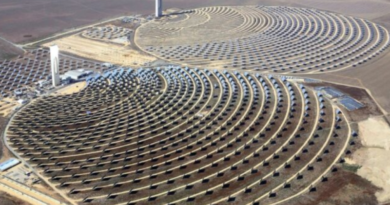‘How to greenwash’: propane industry tries to rebrand fuel as renewable
Members of a propane industry lobbying group strategized to downplay the full climate impacts of propane and market it as “renewable” or “clean energy,” recordings reviewed by the climate newsletter Heated and the Guardian reveal.
The Propane Education & Research Council (Perc), a US lobbying group, has spent nearly $30 million over the last two years on advertisements for fossil fuels, according to data compiled by Drilled, a multimedia reporting project focused on climate accountability. The ads often promote propane, the vast majority of which is a by-product of natural gas or crude oil refining, as a form of clean and renewable energy.
But in a public November 2022 meeting recorded by the Energy and Policy Institute, Perc board members acknowledged that that characterization was inaccurate.
“Twenty-five percent [of people consider] natural gas to be renewable, in this millennial and Gen Z bucket,” an unidentified Perc board member said. “There’s a perception out there—not reality, but that’s perception. We can attach to that for propane.”
“You can’t say natural gas is renewable,” Perc board member Leslie Woodward cautioned.
“Perception,” the unidentified board member repeated.
Erin Hatcher, Perc’s senior vice president of communications and marketing, agreed that propane should be perceived as clean energy. “We don’t want to be in that coal bucket,” she is heard saying on the recording. “We want to be in that clean energy bucket.”
In a comment to Heated and the Guardian, Hatcher said she “did not recall any kind of comment” about mistaking propane as renewable. “Our concern about perception is that all fuels are demonized.”
She added, “There’s no attempt to mislead whatsoever. It’s to educate, because the narrative that predominates the news is that there’s only one way to a clean future, and we don’t believe that.” Woodward did not respond to requests for comment, and Hatcher said she couldn’t identify the other board members who spoke at the meeting.
A 17-fold increase in ‘greenwashing’ advertising
To stabilize a safe climate, scientists say the world’s energy systems must reach net-zero greenhouse emissions by the year 2050. The UN Intergovernmental Panel on Climate Change has said achieving net zero by 2050 will require “a substantial reduction of overall fossil fuel use.”.
Propane is a fossil gas commonly liquified for use in heating and cooking. Typically a by-product of natural gas or crude oil refining, propane can also be made from non-fossil sources like plant, seed, and animal oils, though currently only 0.04% of it is, according to estimates from the EPA and the US Energy Information Administration.
Propane—even “renewable propane” made from plants or cooking oil—emits carbon dioxide and other environmentally harmful fossil fumes. Propane made from fossil fuels emits less carbon than coal or diesel but more than natural gas when burned as fuel, according to the US Energy Information Administration. In 2022, CO2 emissions from propane in the US were a tiny fraction of the carbon emissions from other fossil fuels, but that’s because the US consumes far less propane than gas and oil—not because propane is necessarily cleaner.
Still, Perc has invested millions in a multiyear strategy to rebrand propane from what it’s called a “dirty fossil fuel” to a so-called clean energy source. According to Drilled, Perc’s annual ad spending increased more than 17-fold from 2021 to 2022–23, from $1.7 million to nearly $30 million.
In 2022 and 2023, Perc bought ads touting the “clean energy” potential of propane across 450 media properties, according to Drilled’s data, including more than $9 million on YouTube channels, including YouTube Kids; $4.7 million on Fox News; $2.6 million on Southern Living; $1.5 million on NBC; $979,000 on USA Today; and $746,000 on ESPN.
A spokesperson for Google, which owns YouTube, said the company bans ads that deny climate change or ads that claim human beings or greenhouse gases don’t contribute to global warming. “This policy does not prohibit other climate-related topics, including promotions of various energy sources,” the spokesperson said.
Pitching propane as ‘clean energy’ seems to be just [the fossil fuel industry’s] latest greenwashing scheme
Wren Montgomery of Western University
Fox News, Southern Living, NBC, USA Today, and ESPN did not respond to requests for comment.
The increased ad spending is concerning to clean-energy and misinformation experts, who tell Heated and the Guardian that Perc’s claims are misleading. Propane is not renewable and does not amount to clean energy, they say, nor is renewable propane a realistic or scalable climate solution.
“The fossil fuel industry has been a true trailblazer on one thing over the last few decades – how to greenwash,” said Wren Montgomery, an associate professor of sustainability at Western University. “Pitching propane as ‘clean energy’ seems to be just their latest greenwashing scheme.”
Energy and Policy Institute research manager Charlie Spatz, who attended Perc’s 2022 board meeting, said the fossil fuel industry has long tried to brand its products as renewable. “And so we’ve seen Perc, in some respects, catch up with the oil industry and natural gas industry to present their product as renewable, when in reality that product is not available in quantities that consumers can even access at this point.”
“Nothing is 100% clean,” said Hatcher of Perc. She said that every energy source has “some carbon involved, whether it’s in making a solar panel, a wind turbine, or a dam.”.
But Hatcher stopped short of calling propane “renewable” energy, even though Perc uses the term in its marketing. “Nobody here is trying to pretend that propane is not a fossil fuel-based fuel,” she said. “We’re not trying to pretend that it is renewable.”
When asked to clarify whether propane is as climate-friendly as wind or solar power, Hatcher said, “At the actual operation? No.”
Perc on millennials: ‘We’re in trouble if we don’t win them over’
In July 2021, Perc circulated an internal video calling electrification efforts “an existential threat” and introducing talking points touting propane as “a clean energy solution for everyone.”.
The purpose of the rebrand was to attract a new audience for propane: people who care about the climate crisis. In 2022, Perc presented market research revealing that a promising number of younger, climate-conscious millennials had positive opinions of the fuel.
“We started thinking, is it possible they don’t know the origins of propane?” Hatcher told Perc’s board at its November 2022 annual meeting in Destin, Florida. She presented the results of a survey of 1,000 US adults, which discovered that 97% didn’t consider propane a fossil fuel, even though most of it is. (When she spoke with Heated and the Guardian, Hatcher disputed the 97% figure heard on the recording but declined to provide the marketing survey she can be heard citing in her presentation.)
There was just one obstacle: despite overall positive views of propane, only 9% of Perc’s survey respondents thought propane was renewable energy, Hatcher said. So Perc board members discussed a strategy to market propane from renewable sources in addition to fossil fuel-derived propane.
“When they understand that propane is not only a low-carbon fuel in the conventional version but that renewable energy offers even greater environmental benefits, we can change their opinion of this energy,” said Hatcher.
A second unidentified Perc board member in the meeting pushed back on Hatcher. “When they Google propane and see it’s a fossil fuel, 99% of them [are] going to be immediately turned off propane, whether it is renewable propane or not,” he said.
“We’re in trouble if we don’t win them over; that’s the bottom line,” said Hatcher. “We’re really in trouble. So we need to get them on our side and kind of educate them about the benefits of propane.”
Perc’s position that propane has less of a climate impact than methane gas isn’t true, according to energy experts.
“It is not the lowest greenhouse gas in fossil fuels. It’s somewhere between natural gas and diesel,” said Nikita Pavlenko, the program lead at the International Council on Clean Transportation.
Even “renewable” propane is not zero carbon the way solar or wind energy is. It still emits carbon dioxide, though in smaller amounts than propane made from oil or gas. Nor is “renewable” propane a “widely accessible” alternative, as Perc also claims. The amount of “renewable” propane produced in the US is negligible—about 4.5 million gallons in 2022, according to the EPA. The US propane supply derived from fossil fuels was about 12.7 billion gallons that same year, according to the US Energy Information Administration.
“It’s quite common to promise renewable natural gas, or something like renewable propane,” said Pavlenko, because the people making those promises rarely have to produce it. “They often do very little to secure supply.”
The amount of propane that’s currently made from the camelina plant—the low-carbon alternative featured in many Perc ads, including in the New York Times—is even smaller. “There’s a lot of promises being made about camelina as a feedstock for biofuel, and there’s very little, if any, being processed right now,” Pavlenko said. “The camelina is largely theoretical at this point.” (The amount of camelina propane produced in the US is so small, it’s lumped under “other” feedstocks by agencies that collect data on alternative fuels.)
When asked about these ads, a Times spokesperson said that the newspaper “prohibits advertising that is intentionally misleading, deceptive, or contains false information.”. Perc paid the Times more than $163,000 for ads between 2022 and 2023, according to media-monitoring data compiled by Drilled and reviewed by Heated and the Guardian. Hatcher characterizes these numbers as “estimates.”.
When the numbers are added together, experts say that Perc’s claims that propane is “clean energy,” “environmentally friendly,” and an important part of “the path to zero carbon emissions” amount to nothing more than greenwashing.
Perc’s plans to rebrand in 2024
Still, Perc is redoubling its efforts to rebrand propane as environmentally friendly in 2024.
Documents reviewed by Heated and the Guardian show that Perc is increasing its self-reported advertising budget to $12.8 million next year to reach new audiences, including “eco-inclined” homeowners. (Perc’s self-reported ad budget does not include a $6.4 million category it calls “environmental campaigns” or $1.3 million for “thought leadership”.) The budget includes payments to at least 15 influencers, including stars of HGTV home improvement shows and celebrity chefs. Perc is also rolling out new marketing tactics, like advertising in AccuWeather severe weather alerts.
Perc isn’t just aiming this rhetoric at consumers. It’s also developing it for lawmakers who have the power to regulate and ultimately phase out fossil fuels. This tactic has been successfully used for years by the natural gas industry, said Faye Holder, a program manager at InfluenceMap.
“All these talking points that you see about ‘clean gas’ and ‘gas has lower emissions’” are used in advertising, said Holder. “But they are also all used in the direct lobbying of policymakers [making] climate policies that would otherwise threaten the role and the business of gas.”
This advertising is “very misleading to consumers,” said Holder. “Calling fossil gas a green climate solution is disinformation because it’s just not true.”
Hatcher expressed frustration with people who don’t share Perc’s vision of a world where coal and diesel are replaced by propane, with the goal of combating the climate crisis. “We’re trying to be part of the solution,” she said several times in interviews.
But if the solution to climate change involves winding down fossil fuels entirely, which is the scientific consensus, Hatcher is less sure about the timeline. “Is there a world without propane? Possibly,” she said. “When? Who knows?”
This article was amended on January 26, 2024, to clarify that “renewable” propane is a source of carbon dioxide emissions.
Source :theguardian.com




